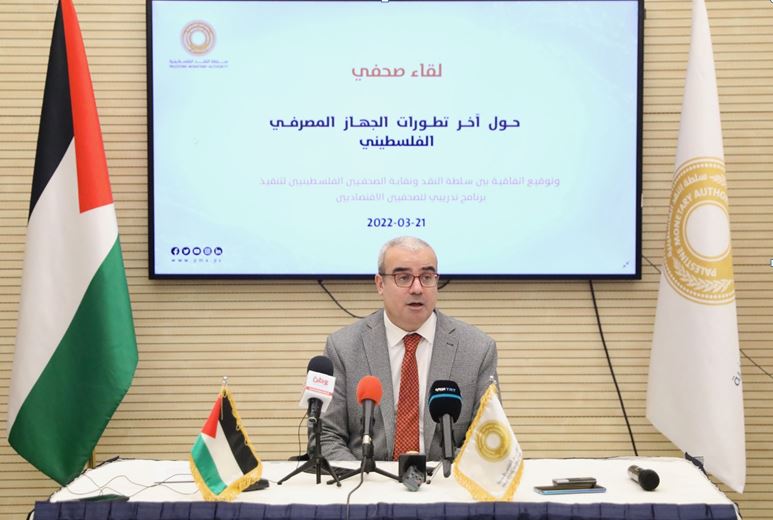
Ramallah /PNN/
The Governor of the Palestine Monetary Authority, Dr. Feras Milhem, met today with journalists and media representatives at the headquarters of the PMA in Ramallah and Al-Bireh Governorate to review the latest developments in the work of the PMA and the banking sector in Palestine.
The Governor welcomed the journalists and thanked them for their professional and responsible role. He stressed the PMA's belief in the necessity of maintaining communication with the media to share the latest banking developments with citizens.
He initiated the meeting by reviewing the general economic situation in light of the obstacles it has encountered since the outbreak of the Coronavirus. He noted that with the return of economic activity in the year 2021, the Palestinian economy achieved a growth rate of about 6%. However, the growth is expected to drop to 4-3% in the year 2022, according to developments in the regional and international arena.
The governor pointed out that there are indications that the Palestinian economy is recovering and that the private sector is growing well, in spite of the obstacles that the country’s public finances face due to the suspension of external financing, which we hope will be resumed by Europeans and Arab countries.
He also noted that the financial solvency of banks is excellent despite the challenging environment in which they operate. Assets have increased by more than 11%, or approximately $21 billion, at the end of 2021, while customer deposits amounted to $16.5 billion. He further called on citizens to invest their money in the Palestinian market to bring about economic development.
Milhem assured that the problem of the accumulation of the Israeli shekel currency in the Palestinian market will soon be resolved. Also, the PMA is following up with the Bank of Israel on the transfer of the salary payments of Palestinian workers in Israel through the banking sector, which is expected to take place before the end of this year.
He added, "Transferring the salaries of workers in Israel through the banks will not result in additional costs. We also assure the workers that there will be no double taxation. He further explained that this step "is in the interest of the workers and for their benefit, as it ensures that the Israeli employers do not tamper with their entitlements, in addition to providing the opportunity for these workers to benefit from banking services."
The governor stressed the importance of the strategy adopted by the PMA and banks, which is based on the need to shift from cash transactions to electronic payment. He pointed out that the PMA recently launched the Point-of-Sale transactions service through the National Key, and reduced fees on merchants from 3.5% to 0.5% to encourage them to deal with cards. He further indicated that imposing a cost on dealing in cash is a result of this strategy. It aims to motivate merchants and citizens to use electronic payment services and find solutions to the accumulation of the Israeli shekel in the Palestinian markets.
He emphasized that this procedure is not for the ordinary citizen, and it will not have any adverse impact on the citizen or an increased cost on him. This procedure targets the merchants and persons with senior commercial interests who deposit money periodically and in large amounts “more than 100,000 shekels.” They make up less than 1% of bank account owners.
Milhem mentioned that the PMA is moving towards licensing digital banks to expand the scope of electronic financial transactions, in parallel with the government's efforts to launch a platform for electronic government services. He extended his congratulations to the Palestinian mothers on the occasion of Mother's Day.
He assured that the PMA focuses on the importance of women's economic empowerment, their access to funding sources, and enhancing their role in economic development.